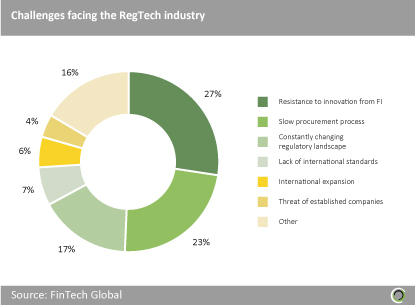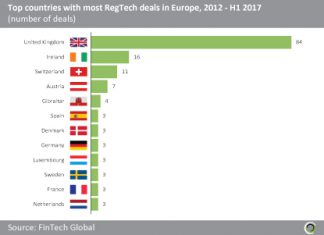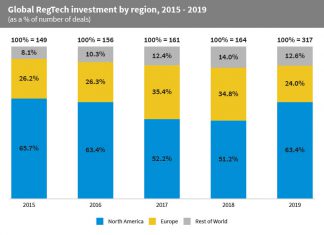Resistance to innovation and slow procurement processes are the biggest industry challenges
According to the RegTech 100 companies, the two largest challenges facing the RegTech industry are: resistance to innovation within financial institutions and slow procurement processes. Whilst there appears to be recognition at senior levels within financial institutions that RegTech needs to be at the top of the agenda, lower and mid-level staff are more resistant. This means that RegTech companies often hit roadblocks, even within organizations that have declared a commitment to enhancing their regulatory technology. Thus, the procurement process itself is often laboured, and sometimes self-defeating.
As one RegTech CEO described it, “It’s absurd that we have to deal with such dated and inefficient procurement processes when the objective is to implement the latest innovations and save the client a fortune.”
The third major challenge is the constantly changing regulatory landscape. Although the increasing complexity and frequency of new legislation are key driving forces in the growth of the RegTech industry, the same factors present challenges to RegTech solution providers trying to demonstrate their value to clients.
13% of RegTech companies mentioned that the lack of international standards and international expansion were challenges facing the industry. The lack of international standards is a well-recognized issue. It is one of the major objectives of the IRTA (International RegTech Association) to work with stakeholders across the industry to build a robust set of accepted standards. The current lack of agreed standards affects the ability of RegTech companies to expand internationally since solutions that work for local markets do not translate across borders and it is a heavy burden to modify software and implementation processes each time a new jurisdiction is targeted.
The sixth industry challenge is competition from incumbent financial institutions. Whilst most RegTech CEOs believe their company’s innovation and nimbleness gives them huge advantages, denial within financial institutions can sometimes manifest itself as a desire to build in-house.
Long sales cycles and scaling up are the biggest challenges facing RegTech companies
The biggest challenges facing RegTech companies directly are long sales cycles and the difficulty of scaling up. The industry-wide challenges of buyer resistance and slow procurement causes sales processes to be long drawn-out affairs, which obviously has significant negative impact on relatively small or young companies.
The challenge of scaling up is thus impacted by the need to engage in a variety of slow procurement processes at the same time as dealing with the industry challenge of working across jurisdictions with different regulations.
The third challenge is deemed to be that of getting prospective clients to understand the value proposition. Whilst the blame here must lie in some part with the failure of RegTech companies to communicate the benefits of their offerings, there is a belief that the compliance and technology managers in some institutions just do not recognize the scale of the problems their organizations face or the need to act decisively.
Other challenges include: hiring the right people with the right skills; adapting to the changing regulatory environment; and having the resources and support to implement solutions for clients.
The need for funding is seen as an issue by only 5% of RegTech CEOs, underlining how hot the RegTech opportunity is perceived to be by investors at present.
Copyright © 2018 RegTech Analyst
Copyright © 2018 RegTech Analyst

















